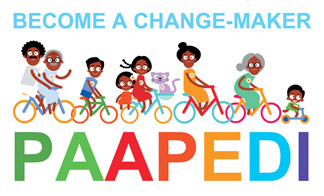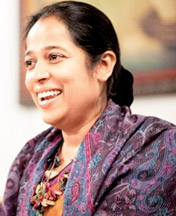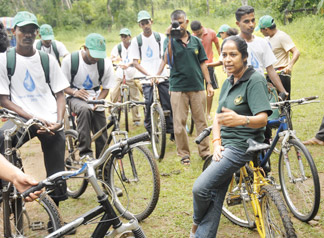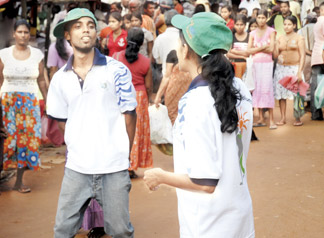|
Organised by youth of a group of conservationists:
Change family concept from Paapedi
 The immensely rich biodiversity is the magnetic power of our
island-nation and is what makes this land a paradise. Out of the total
area of the country which is 65,610 square kilometres and on average
with 323 people living in every square kilometre, 26.5 percent of the
country is declared as protected areas. This is a higher percentage of
protected areas than in all of Asia. The immensely rich biodiversity is the magnetic power of our
island-nation and is what makes this land a paradise. Out of the total
area of the country which is 65,610 square kilometres and on average
with 323 people living in every square kilometre, 26.5 percent of the
country is declared as protected areas. This is a higher percentage of
protected areas than in all of Asia.
Every inch even in a small home garden is a piece of this valuable
heritage of ours. But how much do we know about this? On top of
everything how much do we know about how we are damaging it? Each
individual acts to understand this national asset, and to protect it
matters, especially considering the fate of the future generation. At a
time climate change is affecting every living being on earth how can Sri
Lanka, a top biodiversity hot spot of the world, ignore nature getting
destroyed?
In such a background 25 youth are preparing to put an effort to make
communities living along the Colombo - Anuradhapura road aware of what
is happening to their surroundings riding on bicycles just the way so
many adventurous youth of many generations travelled to the ancient city
Anuradhapura. "Our bicycle journey across Sri Lanka aims to build a
sense of pride and responsibility for this sensitive island and further
the process of empowering young people as social and environmental
actors and to demonstrate how the bicycle can be a positive and powerful
force of social change in this age of fast-paced, consumer driven life,"
said Kanchana Weerakoon, who leads in organising this journey.
|

Kanchana Weerakoon |
The journey is organised by youth of the Eco-Friendly Volunteers, a
group of conservationists. Why bicycles? "The bicycle has become a
global symbol of our shift towards sustainability. In western countries
people are driving less and cycling more, proving that riding a bicycle
is functional, fun, healthy and an environmentally positive
choice,"President of the Eco-Friendly Volunteers (Eco-V) Weerakoon said,
explaining their rationale behind the bicycle journey. Though in
countries like ours bicycles remain primary modes of transportation as
globalisation and modern values become intertwined in the social fabric
of Sri Lanka, many people are choosing motorcycles, cars and
three-wheeled autos. We chose to use bicycles as our transportation
option for this journey as a demonstrative and educational tool to show
people various functions and sustainable attributes to cycling, said
Kanchana.
"We will be producing panniers from recycled materials and bicycle
carts from renewable and recycled materials to demonstrate functional
uses of the bicycle. Our education campaigns will also use the bicycle
to demonstrate zero-emissions and healthy life choices," she said.
Eco-V have named the bicycle journey as 'Paapedi - a bicycle journey
for climate justice' which will be a journey of ten days travelling over
230 kilometres by 25 young girls and boys. "The journey will include a
focus on the study of wetlands and Sri Lanka's extensive and intricate
rain-water catchment system that has, for generations, supplied farmers
with sufficient water to sustain Sri Lankans with over 300 varieties of
indigenous rice.
It is a system now under threat from agrochemical pollution,
unsustainable use, modern mismanagement, invasive species and climate
change," explained Kanchana.
|

Paapedi getting ready |
"Our travellers will educate through interactive street theatre,
formal presentations, personal conversation and story-telling. We will
teach them how to do water quality testing, air quality testing and
about the importance of organic, wholesome and sustainable living," she
said.
Started in 2001, ECO-V has a network of 400 volunteers throughout Sri
Lanka who have dedicated themselves to conservation of the environment.
They contribute to the projects whenever their support is needed.
Kanchana says this is an effort in planting green leaders.
"The ECO-V concept of approaching climate change and environmental
degradation is to develop community based leaders across Sri Lanka, to
nurture their enthusiasm and passion, and to support them with
trainings, opportunities, journeys and skills so that they grow into
their greatest capacity as environmental stewards," Kanchana added.
"Climate Change issues are still not widely discussed at the grass
roots level in Sri Lanka. Over 2011 river journey was the first National
level campaign that was able to reach grass roots level communities
along the Kelani River. Many people are not aware of adaptation and
mitigation strategies and we aim to share knowledge and inspire new
thinking around environmental protection.
There is a pressing need for a national level awareness campaign
targeted at improving understanding amongst the younger generation and
to support them to grow into future community leadership roles,"
Kanchana said.
|

Eco-V volunteers in a street drama during the 2011 journey |
According to Kanchana Eco-V have created the concept of a journey for
climate justice as a process to give young people access to a practical
and safe learning space. "In 2011 we coordinated a journey along the
entire length of the Kelani River, from its source at Adam's Peak to its
confluence with the sea. With the first journey we realised the
potential of this transformative process of young Sri Lankans. Many
continuing in carrying forward their vision of a sustainable society,"
said Kanchana proudly remembering their first experience in climate
journey.
"Participants in this year journey will come from every province in
Sri Lanka and we aim to have a group with an equal number of male and
female travellers. The journey will also include a number of foreign
volunteers with expertise in environmental education and bicycle
advocacy and maintenance. The international youth will bring additional
support, but will also help show that climate change is a global issue
that requires action at local, national and international levels," as
Kanchana said.
As she further explained the multi modes of their journey environment
is an ethnically neutral concern and the consequences of human induced
climate change will affect everyone equally thus using this factor will
be an entry point to build inter-cultural relationships which is a
viable and an opportunity to forge lasting and positive avenues for
inter-cultural collaboration. "We are having a long term plan of
'Paapedi' taking forward. For that we have a concept called Change
family. We are working towards individual change to family and then
society and the country," Kanchana said.
- DY
|



